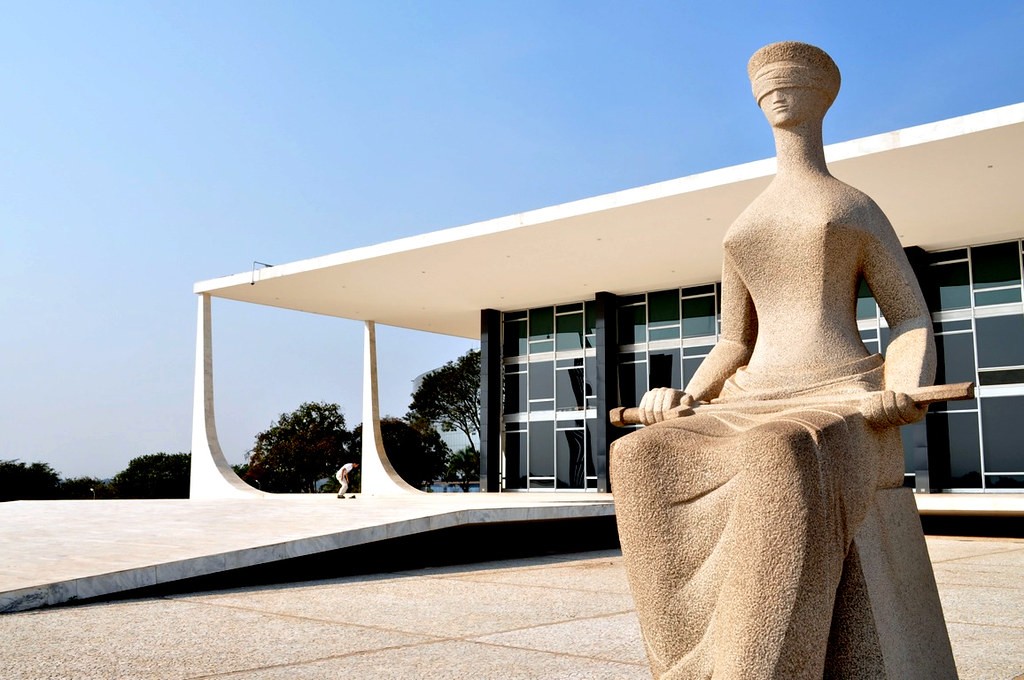Brazil’s Judiciary: Defender of Democracy
For several years now, Brazilian democracy has been subjected to a stress test. President Bolsonaro’s rhetoric and concrete actions have proven him to be a threat to democracy. The judiciary, however, especially the Supreme Court (Supremo Tribunal Federal, STF), has repeatedly been able to stop intended democratic backsliding.
Since taking office in 2019, Bolsonaro has acted as a populist leader who has repeatedly openly questioned democratic rules and norms and incited his supporters to engage in anti-democratic behavior. Credit must be given to the existing control mechanisms of the political system for preventing some of the worst excesses of the president’s political plans so far.
The Brazil Report of the Transformation Index BTI 2020 rates the independence of the judiciary at 7 points out of 10, citing the judges’ broad powers to review the constitutionality of government action. Focusing on the difficult relationship between President Bolsonaro and the judicial power, which also made international headlines in 2021, this article distinguishes between two issues: the defense of the constitutional order and the fight against corruption. While the judiciary has not shied away from open confrontation with the president in defense of constitutional order over the past three years, it has responded less vigorously to Bolsonaro’s efforts to limit relevant anti-corruption investigations.
Defense of the Constitutional Order
Repeatedly preventing the implementation of government measures it deemed unconstitutional, Brazil’s Supreme Court since 2019 took measures related to the executive branch’s pandemic policies and minority rights. For instance, in May 2020, the STF overturned a decree issued by the federal government to prohibit homosexual and bisexual men from donating blood. In the wake of the COVID-19 pandemic, tensions between the executive and judicial branches increased. In April 2020, the STF confirmed that states and municipalities had the authority to take independent action to combat the pandemic. After the government stalled the publication of statistics on infection cases and COVID-19-related deaths in June 2020, the Supreme Court ordered the government to resume publications. Already in July 2020, an STF judge called the government’s handling of the pandemic a “genocide” against the indigenous population for the first time. That same month, the STF ordered the executive branch to better protect them from COVID-19.
The president reacted irritably to such orders. In March 2020, he publicly demanded that the police not carry out “absurd orders” from the Supreme Court. Apart from openly attacking the STF, radicalized Bolsonaro supporters called for military intervention. Bolsonaro repeatedly participated in these protests. The president also openly toyed with the idea of giving the armed forces a “moderating role” in the conflict between the two powers. Since Bolsonaro has been known for many years as an explicit supporter of the military dictatorship of 1964 to 1985, such statements raised fears of bad things to come. There was also speculation about the possibility of a coup d’état.
After tensions between the executive and judicial branches initially eased in the further course of 2020, they came to a head again in 2021. Important causes were the government’s problematic pandemic and vaccination policies, as well as the president’s completely groundless verbal attacks against the country’s electronic voting system, which has functioned smoothly for decades. Experts interpreted Bolsonaro’s attacks as an indication that, in the event of defeat in the 2022 presidential elections, he might, in the style of Donald Trump, refuse to recognize the election results or even initiate a coup d’état with the support of his radicalized supporters.
Bolsonaro increasingly made the Supreme Court one of his favorite targets. Spreading hate speech against judges who investigate him or his entourage, he calls them cancerous ulcer, speaks of a “war to be won” concerning the tensions between the executive and judicial branches, and calls for impeachment proceedings against critical representatives of the judiciary. The clashes reached a climax on September 7, 2021, Brazil’s Independence Day. Anti-democratic demonstrations by Bolsonaro supporters in many of the country’s major cities included calls for the dissolution of Congress and military intervention. The night before, Bolsonaro supporters unsuccessfully attempted to storm the STF building in the capital Brasília.
By now, various investigations by the STF and other courts, such as the Supreme Electoral Court (TSE), are underway against the president and his entourage. The charges include defamation, incitement to crime, publication of secret information from confidential files, and the dissemination of fake news. In late October 2021, a Senate committee submitted an investigative report on the head of state’s COVID-19 policy after six months of work, accusing him of numerous crimes, such as deceiving the public and inciting crime. Calling for legal consequences for Bolsonaro, the committee suggested that the STF block all of the president’s social media channels for falsely making a connection between vaccinations against COVID-19 and AIDS.
Role of the Judiciary in the Fight against Corruption
In defense of the constitutional order, the judiciary does not avoid confrontation with the executive. However, this is less clearly the case concerning the president’s efforts to roll back the fight against corruption. Bolsonaro had promised in the 2018 election campaign to put an end to corruption in Brazil. Being known as an eccentric and right-wing politician, he benefited from the fact that voters had lost confidence in the established political parties due to major corruption scandals, most notably the “Operation Car Wash” (Lava Jato) scandal uncovered in early 2014. After taking office, however, it quickly became clear that Bolsonaro’s commitments to fighting corruption were little more than a campaign slogan. While law enforcement was very active in the fight against corruption until 2018, it has declined significantly since 2019. Numerous individuals from Bolsonaro’s family and political circle face corruption charges. The credibility of Sérgio Moro, who had earned a reputation as a resolute anti-corruption fighter as the federal judge in charge since 2014 and whom President Bolsonaro made Minister of Justice, was also permanently shaken. In 2020, it emerged that Moro had, in turn, abused the law to convict high-ranking politicians such as former President Lula. Moro was then forced to resign as minister of justice.
The mandate of the Operation Car Wash task force was not further extended and expired in February 2021. Declaring that there was no longer any corruption in the government, President Bolsonaro claimed in October 2018 that the corresponding anti-corruption investigation had ended. Although the president was not directly responsible for the termination of the mandate, this was seen as another sign that his government only takes the fight against corruption seriously when it can be instrumentalized for political campaigns or against political opponents. In addition, for all the conflicts with Bolsonaro, large parts of the country’s established political class also favored rolling back corruption investigations. Even the Supreme Court made no particular effort to change this. Apparently, the STF is concentrating its energies on disputes in defense of the constitution.
Uncertain Future of Brazilian Democracy
President Bolsonaro is at the center of criticism in many respects. Numerous petitions for impeachment proceedings against him have been introduced in Congress. However, in the spring of 2021, the president helped people close to him win the speaker elections in the Chamber of Deputies and the Senate. Since no impeachment can be initiated without the approval of the speakers, no such proceedings currently have a chance of success. The president will thus continue to try to push through his ultraconservative agenda in his fourth year in office. It remains to be seen whether the checks and balances of Brazilian democracy will remain strong enough to prevent the worst from happening.

